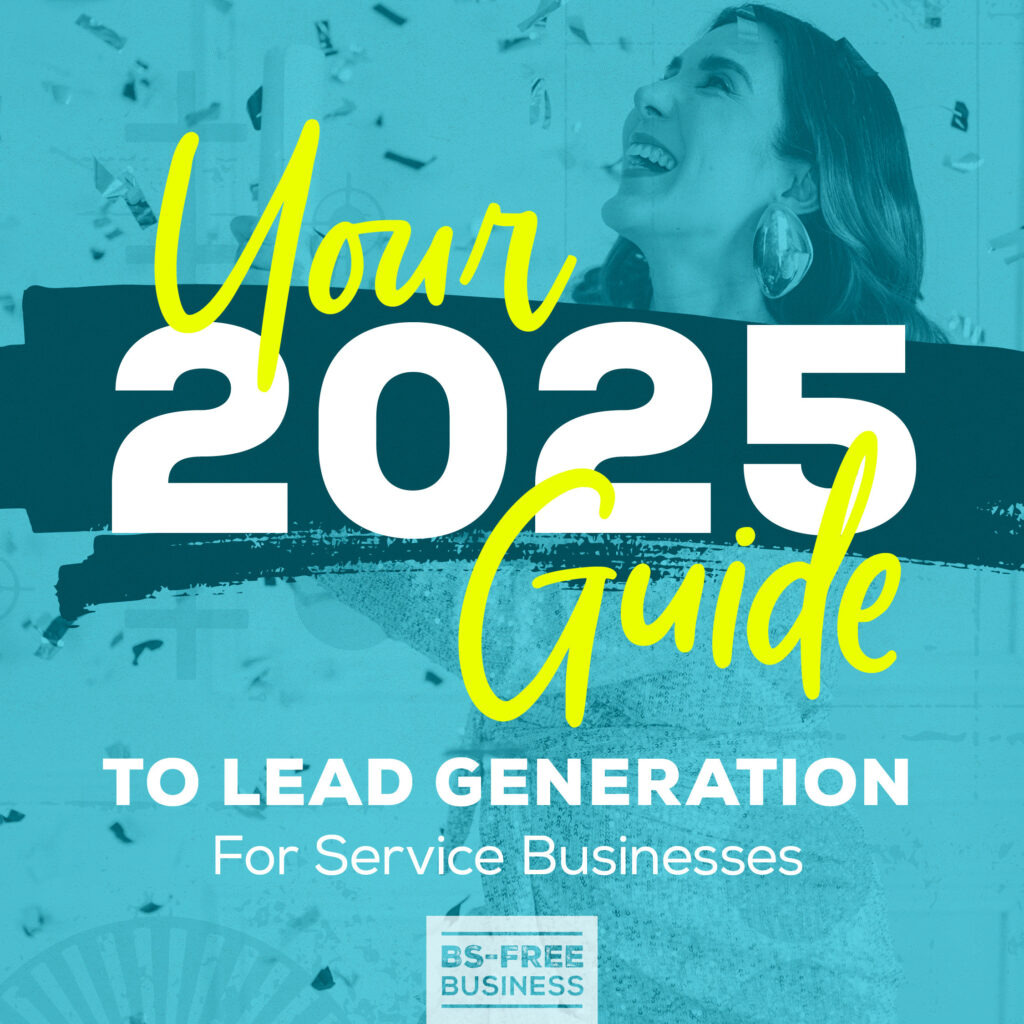
Search the site:
Your 2025 Guide to Lead Generation for Service Businesses
The economy’s rollercoaster ride in recent years has reshaped lead generation for service businesses, forcing a shift in strategies to adapt to new challenges and opportunities.
In my experience, many business owners shy away from lead generation and instead pour their energy into tasks that feel productive but don’t move the needle. It’s easy to get caught up in busy work, like tweaking your website or creating another offer.
But here’s the truth: none of that will matter if you don’t have a steady stream of clients.
You need to focus on the basics of lead generation because, without clients, there’s no business. Clients are how you get paid, and no amount of extra “productive” tasks will replace that fundamental need.
Finding clients should always be your top priority, no matter where you are in your business journey. Even if you’re fully booked and have clients lining up to work with you, the past few years have taught us that we can’t afford to get complacent.
Things change. Clients leave. If you’re unprepared, getting back on track will be much more challenging.
So, how do you simplify, streamline and create a lead generation (aka marketing) plan that doesn’t add much extra work to your plate?
Here’s a rundown of ideas for lead generation for service businesses that you can use in the coming year.
What is Lead Generation?
Lead generation is about attracting people who might need your services and turning them into potential clients. It’s the first step in building a connection that could lead to a sale.
Whether you use online tactics like social media and SEO or offline strategies like in-person networking, the goal is simple: connect with people who may need your services.
Lead generation is necessary for service businesses because your success hinges on building relationships and consistently bringing in new clients.
Unlike selling products, offering services relies heavily on trust and personal connections. A solid lead generation strategy ensures you connect with the right people, keeping your client pipeline full and your business thriving.
It’s not uncommon for service business owners to take a passive approach to finding clients, which does work up to a certain point. But as the saying goes, “what got you here won’t get you there,” and that passive approach may limit your ability to grow.
Many of my clients have reached a point in their business where they need to become more proactive about lead generation. Ultimately, getting proactive about finding clients helps you take control and eliminate the feeling of panic that comes from waiting for potential clients to appear magically.
As a service business owner, you have limited time and energy to invest in marketing, so you need to be intentional about your approach.
Before You Create a Plan: Narrow Down Your Niche
Going into 2025, specificity is the name of the game. You need to focus on the right people to sell your services and turn prospects into paying clients.
Real talk: The number of leads you can generate is irrelevant if most of them don’t convert. You must focus on quality, not quantity because your services aren’t for everyone.
One of the biggest mistakes of service business owners is not being specific enough about the “people” part of their business. You can’t just pick an industry or identify an ideal client; you must go deeper to speak to a clearly defined potential client.
A great example of this is when people say their clients are “small businesses” or “women entrepreneurs.” These are broad categories, but they’re far from being a niche audience.
By definition, a niche is a specialized market segment so that you can speak directly to its unique needs, interests, and preferences. With that, your positioning will be stronger, making it much easier to market and sell your services.
Remember, your goal is to build relationships and generate high-quality leads that become loyal clients.
Even if you’ve been through this exercise in the past, now’s the time to revisit it by asking the following questions:
- What is my niche?
- What problems are my clients facing?
- What are they trying to accomplish?
- How can my services help them?
Remember, the market is constantly shifting, so you need to revisit these questions periodically to ensure your positioning and that your packages are still relevant.
Strategies for Lead Generation for Service Businesses
Now, let’s look at proven strategies for lead generation in service businesses; remember that this isn’t a one-size-fits-all thing.
What works well for lead generation in one service business may be less effective for another. I’m all about experimenting with your approach, so if you try one thing and it’s not working, move on to the next one.
#1. Start With Your Network
One of the quickest ways to find more clients is by tapping into your personal and professional network. As the saying goes, “It’s not what you know; it’s who you know.” Building and maintaining strong relationships within your network can be a game-changer for service providers.
Your network is one of your most valuable assets in business. People who know you often want to see you succeed and are likelier to recommend or connect you with potential clients. Don’t underestimate their willingness to help when you nurture those relationships.
Make it a habit to stay in touch with your network regularly. Set aside time each week or month to check in with people—whether it’s a quick call, email, or coffee meeting. It’s a simple effort, but it can yield incredible results. I’ve found repeatedly that maintaining these connections often leads to unexpected opportunities and referrals.
#2. Ask for Referrals
Make it a habit to ask for referrals. Contact current or past clients who might know someone who needs your services, or ask colleagues and professional contacts. Don’t wait for referrals to happen on their own—actively asking keeps you on people’s radar and reminds them you’re looking for new clients.
Also, take the chance to find clients through collaborations with other service providers or subcontracting. I kept my client list full while freelancing by subcontracting with a small PR agency.
Even now, with my micro agency, we often collaborate with other marketing agencies or service providers on projects. Building strong partnerships where you’re a preferred collaborator saves you the time and effort to find clients independently.
#3. Make Connections in Your Communities
Whether online or in-person, the communities —like mastermind groups— you’re part of can be great places to find potential clients. By actively participating and building relationships in these groups, you connect with people who could become clients or collaborators.
Online communities, like Slack channels or forums, are excellent for positioning yourself as an expert. The key is to contribute actively and offer value, not just observe. Show up, share insights, and focus on helping others, which helps build trust and connections.
In-person events are another effective way to tap into communities. From large industry conferences to smaller niche meetups, focus on events where your ideal clients are likely to be, not just gatherings filled with people who do what you do. Look for smaller groups or side events—these can be ideal for forming more profound connections.
Don’t forget about local networking opportunities, some of which can be found through LinkedIn. Most areas have business groups, like chambers of commerce or industry-specific meetups, that can help you connect with potential clients in your community. Getting involved locally can be a straightforward and effective way to expand your network.
#4. Get On Other People’s Platforms
When you’ve tried all the usual ways to find clients, it’s time to focus on creating content and building your platform. But before jumping into blogging, podcasting, or growing an email list, remember that those strategies rely on clients finding you.
Instead, why not go directly to where your potential clients already are? This is what I call using Other People’s Platforms (OPPs), and it’s a faster way to build your audience and reputation without starting from scratch.
The beauty of OPPs is that you can focus on what you’re naturally good at while expanding your reach. When someone features you, it’s a powerful endorsement of your skills and experience, helping you gain credibility and visibility.
OPPs can include things like:
- Speaking at events.
- Guest appearances on podcasts.
- Teaching in someone else’s community or program.
- Writing guest blog posts.
- Being featured as an expert in media outlets.
If you’re new to this, start with just one platform. Think about what makes you unique and how you can provide value to their audience. Research the platform’s preferences, pitching process, and submission guidelines.
When you’re ready to reach out, tailor your pitch carefully to stand out and show why you’re the perfect fit.
#5. Add Content Marketing
You may be surprised that, as a content marketer myself, this one wasn’t at the top of the list. However, when it comes to lead generation for service businesses, many content marketing activities are a “long game.” That’s not to say they can’t be effective (they can!), but some of these tactics require a longer runway before you start seeing results.
Content marketing (blogging, videos, etc) and search engine optimization (SEO) can be a powerful combination to attract potential clients and position your business as a trusted expert.
Content marketing is focused on creating helpful materials like blog posts or guides that show off your expertise. For example, an accountant might write a blog on budgeting tips or make a video explaining retirement planning. This kind of content helps your audience solve problems while showing that you know your stuff.
People who see your value are more likely to trust you and reach out when they need your services. Quality content keeps your audience interested and can generate leads or referrals. Search Engine Optimization (SEO) works alongside content marketing to help people find you online. Using the right keywords can help ensure your website shows up when potential clients search for services like yours.
For instance, a designer could target keyword terms like “best graphic designer near me” or “graphic design services in [city].” Good SEO drives traffic to your site from people actively looking for what you offer, giving you more chances to connect with qualified leads.
Lead Generation For Service Businesses: Track Your Progress
Before you start working on lead generation for service businesses, don’t forget to consider how you will track your progress.
By measuring the effectiveness of your strategies, you can identify what’s working and what’s not, ensuring you’re investing time and resources where they matter most. Regularly reviewing metrics like the number of leads and close rate allows you to refine your approach and stay ahead of market changes.
When you take the time to check in on and tweak your lead gen strategies regularly, you’re not just reacting to problems—you’re actively driving your growth. Keeping track of your progress ensures your strategies stay focused, efficient, and aligned with your business goals.

I’m Maggie Patterson (she/her), and services businesses are my business.
I have 20+ years of experience with client services, am a consultant for agency owners, creatives, and consultants, and vocal advocate for humane business practices rooted in empathy, respect, and trust.
Read or Listen to the Latest
For Solo Business Owners

Growing a solo service business is tough.
It’s even harder when you’re bombarded with BS advice that steers you away from your values and why you started your business in the first place.
This is the podcast for solo creatives and consultants who want to remain as a team of one and have zero interest in the hustle and grind of typical business teachings.
Subscribe now and never miss an episode.
For Micro Agency Owners
Most podcasts for agency owners obsess over revenue growth as the ultimate success metric.

But here’s the truth: not everyone wants to make millions. Your goal might be to build a sustainable business that lets you have a life and doesn’t run you into the ground.
Join me as I spill my shameless confessions and share everything I’ve learned about building a micro agency that skips the BS of tired and typical agency teachings.
Follow Now on All Major Podcast Platforms








